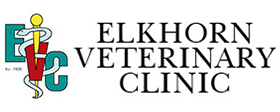Preventive Care for Dogs
Commit to a lifetime of health.
Preventive care is an essential part of keeping your dog happy and healthy. It will give you peace of mind and increase the odds of detecting underlying health conditions before they become advanced and expensive.
How often should my dog see a veterinarian?
At Elkhorn Veterinary Clinic, we make our preventive care recommendations using the guidelines established by the American Veterinary Medical Association (AVMA) and the American Animal Hospital Association (AAHA). From there, our veterinarians further customize their suggestions based on hereditary factors including your dog’s age, lifestyle, and medical history.
Typically, we suggest scheduling at least one annual exam during which one of our veterinarians will review your dog’s medical history, assess their behavior, make dietary recommendations, and evaluate any known health conditions they may have.
What should I expect from a preventive dog care exam?
Think of your dog’s annual exam like your own yearly physical. At the appointment, we’ll read their temperature, examine their eyes, ears, teeth, and skin, listen to their heart and lungs, and evaluate their joint health.
You can also expect your veterinarian to make recommendations for:
- Vaccines based on your dog’s lifestyle or breed
- Core vaccines include rabies, distemper, and Leptospirosis, although your veterinarian may recommend additional vaccines like canine influenza, Bordetella, and Lyme - Parasite prevention products to keep your dog safe from fleas, ticks, intestinal worms, and heartworms
- Diagnostic testing to identify any health conditions that cannot be detected during a physical exam and to confirm your dog is free from internal parasites
At your dog’s annual exam, your veterinarian will answer any questions you may have and discuss other services that could improve their overall health such as spay or neutering, microchipping, and dental care.
Common Diseases Affecting Dogs
- Rabies
- Rabies is a lethal viral disease that attacks the central nervous system. Signs of rabies include fever, paralysis, foaming at the mouth, seizures, and an inability to swallow.
- Distemper
- Like rabies, distemper is often fatal. In dogs, this disease affects the gastrointestinal, respiratory, and nervous systems. Early signs include watery discharge from the eyes, fever, nasal discharge, coughing, and lethargy.
- Parvovirus
- Parvo is an extremely serious illness that mostly affects puppies and unvaccinated dogs. Symptoms include vomiting, bloody diarrhea, fever, and lethargy.
- Hepatitis
- Hepatitis affects the liver, kidneys, lungs, blood vessel lining, and other organs. Clinical signs include fever, an increased heart rate, loss of appetite, eye and nose inflammation, and excessive thirst.
- Parainfluenza
- This highly contagious respiratory virus can be a health risk for dogs in shelters, boarding kennels, daycare programs, and grooming salons. Clinical signs include a dry or a moist cough, low fever, nasal discharge, lethargy, and lack of appetite.
- Canine Influenza
- This airborne virus has two strains; H3N8 and H3N2. Also very contagious, CIV causes chronic coughing, fever, and discharge from the eyes and nose.
- Leptospirosis
- Lepto is a bacterial infection found in lakes, streams, puddles, and damp soil. Infected animals shed this bacteria in their urine and saliva. Infection is likely to occur if the bacteria enter the bloodstream through a tiny break in the skin or through your dog's mucous membranes. Lepto is also a zoonotic disease, which means animals can pass the disease on to humans. Symptoms may include lethargy, excessive drinking and urinating, vomiting, and diarrhea.
- Bordetella
- Also known as kennel cough, Bordetella is an upper respiratory infection commonly spread among dogs in kennels, shelters, dog parks, grooming salons, and other places where multiple dogs may come into contact with one another.
- Lyme Disease
- The most harmful tick-borne disease, Lyme disease causes swelling of the joints which leads to lameness, fever, swollen lymph nodes, and lethargy. Clinical illness usually takes several months to develop.
To schedule your dog’s annual exam, call us at (262) 723-2644 or request an dog exam appointment online.

